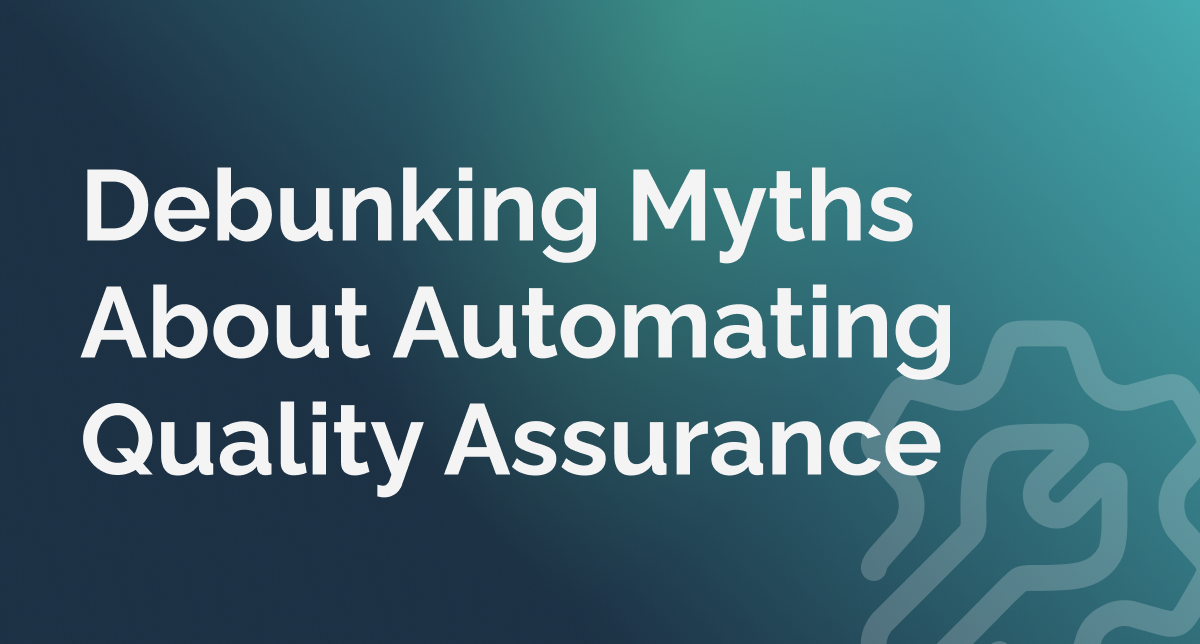In regulated industries such as pharmaceuticals, finance, and healthcare, quality assurance (QA) is not just a checkbox – it’s a critical component of maintaining compliance and operational success. However, as these industries scale and regulations grow more complex, traditional manual QA processes are struggling to keep up.
Automation has emerged as a game-changer, streamlining workflows, reducing errors, and improving efficiency. Yet, many organizations are hesitant to adopt automation due to misconceptions that it’s too expensive, overly complex, or unsuitable for their needs.
Let’s tackle some of these common myths and show how solutions like those offered by InformaIT make automating QA simple, cost-effective, and highly beneficial for regulated industries.
Myth 1: “Automation is too expensive for my organization”
The Reality: While automation does require an upfront investment, it delivers significant cost savings in the long run by improving efficiency, reducing errors, and lowering compliance risks.
Breaking It Down:
- Cost of Errors: In regulated industries, even minor mistakes in labeling or documentation can result in fines, recalls, or delayed approvals—costing far more than the price of automation.
- Improved Efficiency: Automation tools streamline repetitive tasks, allowing your team to focus on higher-value activities, ultimately saving time and resources.
- Scalability: As your business grows, automated systems can handle larger volumes without requiring proportional increases in labor costs.
Myth 2: “Automation is too complex to implement and use”
The Reality: Modern automation solutions are built with user-friendliness in mind. Implementation is often faster and simpler than anticipated, and ongoing use requires minimal training.
Breaking It Down:
- Ease of Integration: Today’s tools are designed to integrate seamlessly with existing workflows, minimizing disruption during the transition.
- User-Friendly Interfaces: Many solutions, including those offered by InformaIT, feature intuitive dashboards that make it easy for teams to adopt and use automation effectively.
- Training and Support: Vendors like InformaIT provide dedicated support and training, ensuring a smooth onboarding process for all users.
Myth 3: “Automation can’t handle the complexity of regulated industries”
The Reality: Automation tools are purpose-built to manage the intricate requirements of regulated industries, including compliance with strict standards like FDA, EMA, or GDPR regulations.
Breaking It Down:
- Regulatory Knowledge: Advanced automation tools are equipped with pre-configured templates and compliance settings specific to regulated industries.
- Audit Trails: Automated systems provide comprehensive logs of all changes and actions, ensuring full transparency during audits.
- Real-Time Compliance Checks: Automation can flag potential compliance issues as they arise, preventing costly mistakes.
Myth 4: “Automation will replace human roles”
The Reality: Automation is designed to complement human expertise, not replace it. By handling repetitive, error-prone tasks, automation allows professionals to focus on strategic and creative work.
Breaking It Down:
- Enhanced Collaboration: Automation ensures consistency and accuracy, enabling teams to collaborate more effectively without worrying about manual discrepancies.
- Time Savings: With repetitive tasks automated, QA teams can dedicate more time to high-priority projects and decision-making.
- Error Reduction: Automation reduces human errors, but human oversight ensures critical thinking and context-specific adjustments.
Myth 5: “Automation is only for large organizations”
The Reality: Automation is scalable and can be tailored to fit organizations of all sizes, from startups to multinational enterprises.
Breaking It Down:
- Flexible Pricing Models: Many automation providers, including InformaIT, offer scalable pricing based on the size and needs of your organization.
- Scalable Solutions: Automation systems can grow alongside your business, adapting to increased workloads and evolving regulatory requirements.
- Accessibility: Advances in technology have made automation more affordable and accessible than ever, with solutions tailored to smaller teams and budgets.
Why Automation Is the Future of Quality Assurance
Regulated industries are facing increasing complexity, tighter deadlines, and growing demands for accuracy. Automation is no longer a luxury—it’s a necessity for staying competitive, compliant, and efficient.
By breaking down these common myths, it’s clear that automation is:
- Affordable: With long-term savings that outweigh initial costs.
- Accessible: Easy to implement and use, with solutions for businesses of all sizes.
- Effective: Purpose-built to handle the complexities of regulated industries.
- Collaborative: Designed to enhance human expertise, not replace it.
InformaIT's solution
- Our cost-effective tools, such as AI-driven content comparison and OCR, are designed to deliver a quick return on investment. They eliminate the need for extensive manual processes while ensuring accuracy and compliance.
- Our platform prioritizes simplicity, with customizable workflows and an intuitive design that allows even non-technical users to benefit from automation immediately.
- Our tools are specifically tailored to the needs of regulated industries, offering built-in compliance features and real-time validation to help businesses stay ahead of regulatory demands.
- Our solutions are designed to augment your team’s capabilities, acting as a reliable partner in quality assurance while freeing up your experts for more impactful work.
- We provide flexible, scalable tools that deliver value to organizations of any size, ensuring that even smaller companies can enjoy the benefits of automation.
Conclusion
The misconceptions surrounding automation often prevent businesses from reaping its full benefits. By understanding the reality behind these myths, you can make informed decisions that improve your quality assurance processes and drive success.




